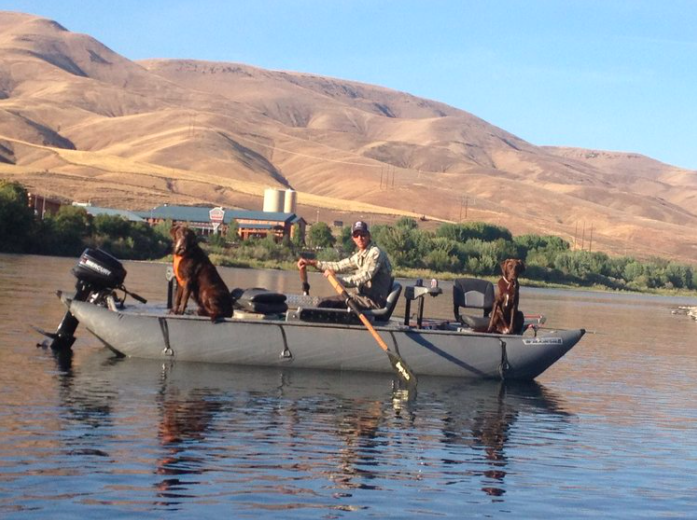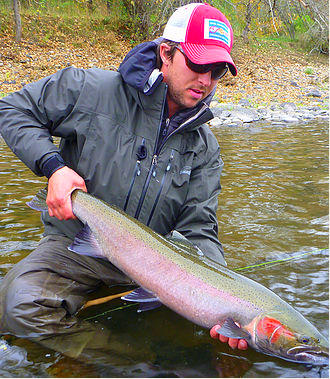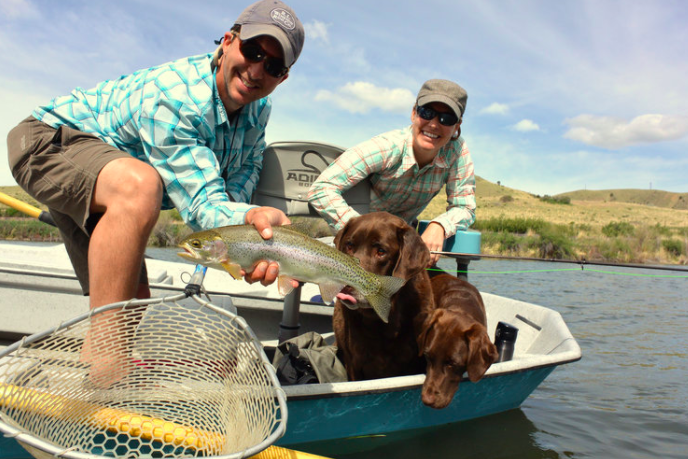GUIDE OF THE MONTH: ZACK WILLIAMS, STEELHEAD GUIDE
Interviewed by Ian Faurot
[Zack and Ian met up on the Clearwater River to do this interview. The audio has the sounds of dogs playing in the sand and trucks across the river on the highway. For the interview they watched their good friend Steven fish through a particularly juicy stretch of river]
Name: Zack WIlliams
Hometown : Pullman, Washington
Current Location: Hanging out on the Clearwater River
Job Titles: Head guide at Clearwater Steelhead Syndicate, Owner of PNW Spey Guides in Washington and Owner and Editor of Swing The Fly, quarterly fly fishing magazine.
Ian Faurot: How did you come to be a guide on Idaho’s Clearwater River?
Zack Williams: My guide service started on the Olympic Peninsula in Western Washington in 2010. While living there I met my now wife, and we relocated to Pullman Washington in 2012. I’d been coming to the Clearwater River for a few years and it had become my favorite river to fish on. So when we made the move to this area I knew I wanted to pursue guiding on this river, so I met the guides from the Clearwater Steelhead Syndicate, got to know them, and the opportunity came about to start guiding. A couple of years later I took over the head guiding position.
You relocated to the Clearwater because you liked it so much. Why do you like it so much?
It's a unique river as far as steelhead rivers go, in terms of how we can fish it, also in terms of the size of the river and the amount of water. Those were big factors, we get to fish in a very traditional style here, and its a long season too, so there’s lots of time to fish. And then the overall area is just great, there’s a lot of different fishing opportunities, and lots of opportunities to camp and be outside, and hopefully lots of space to keep doing it.
Fishing for steelhead on a fly is a long journey right?
Well yeah there’s certainly a learning curve and most people get into it for the challenge, and the aesthetic reasons of it, opposed to the number of fish you’re going to catch. If you’re into it to catch the most fish, there’s probably a better method out there. But if you’re into the entire experience then its a great way to go about it.
So on your own personal journey, who or what has inspired you to keep on keeping on?
My biggest inspiration has been a book by Trey Combs, called Steelhead Fly Fishing, that was published in 1991. As a kid growing up in Michigan, I would read about steelhead fishing in the Northwest. There’s a whole chapter on the Clearwater River in there. That was a huge inspiration in getting started. From there, there’s almost too many others to mention who have inspired and influenced and helped me. But that book inspired me to want to do this, and to do it in a traditional (swung fly) method.
You mentioned earlier that you guide in Washington for part of the year, and Idaho for part of the year. How are the two states different in terms of restrictions, fishing opportunities, and anything else?
Well, Washington is kind of a free for all considering regulations. It's very easy to get a guides license, and when you have a guides license, you can guide anywhere you want, and any way you want essentially. The outfitter system in Idaho is much more restrictive, and you have to work for an outfitter who is licensed and permitted on the specific body of water that you want to guide. So I am an employee of the Clearwater Steelhead Syndicate, who holds the permit that I work under. What that means to me is Washington, while it’s great for my own personal business and to be able to do what I want, it’s not the best thing for the resource, and what it has meant is that a lot of bodies of water have become very crowded, and a lot of publicity that goes with that, and a lot of people showing up. It’s having an impact on the resource. In Idaho it’s harder for me personally to make a living as a guide, but it’s better for the resource, and I think that should always should be most important thing, protecting the resource. So the outfitter system does a really good job of that. There’s always room for improvement, it’s not perfect, but it’s something.
What about fishing opportunities compared across the two states?
There’s lots of opportunities depending on the seasons in both states. There’s no river like the Clearwater, that has fish in it for such a long portion of the year, but in Washington, you can jump around to different rivers that have different fish during different times. You can always find opportunities. Coming from fishing steelhead in the Great Lakes, our season was very short out there. One of the things that drew me to fishing out here was that I could do it on a longer term basis, and I could be out there more, and I think we’re very lucky out here, in both states.
Steelhead on a swung fly, may be my best biggest passion. They’re just awesome, and they have worked their way into my psyche, and they won’t get out. If you had to pick a highlight of it, could you tell me your favorite part about it? Not only for you, but also in terms of guiding?
Ooh! Well, I would say for both, if you start to think about what a steelhead is and what it has done in its life, by the time we go and fish for them in Idaho for instance. You think of a little wild steelhead fry, born way up the Lochsa or Selway, 600 some odd miles from saltwater. It goes down through all the dams on the Snake and the Columbia, all the way out to the Pacific Ocean, it might swim as far as Japan and back in a year or two’s time. And then it comes back through all those dams, and another 600 miles back by the time we get the chance to interact with them. That's quite a journey, and very few fish have done it. They’re a special creature, and just the chance to get to interact or see one is pretty incredible. I’ve been lucky enough to fish for steelhead quite a bit over 20 some years now. I can’t say that I get the same excitement every time I hook a fish as I used to, but there's still something special every time you see one. And from a guiding standpoint, the excitement is higher to see a client catch their first or a particularly memorable steelhead, where they might not have had as much opportunity as I have had. But to see them have that opportunity and the excitement on their face, and to have a chance to be a part of that and to help them get to that goal is pretty neat.
As far as guiding goes, realistically we aren’t helping clients land and unhook fish every 10 minutes right?
No, we’re happy fly fishing for steelhead, we’re thrilled if we get one in a day. And most people that come into this are aware of that from the start, and so we’re working towards a goal so it’s a process. Hopefully we’re enjoying the other stuff about it as well. In my experience the harder somebody works for that fish, the more they appreciate it. Rather than if you just go out there and do it the easy way, and there are easier ways, and you get one, but in my experience I don’t see the same appreciation for the fish.
So with that, a lot of time on the water is spent not catching fish. What are you doing when you’re guiding? Are you teaching, are you cheerleading, are you bullshitting?
It’s a combination, and every client is different, so you gotta kinda read the room I think. Sometimes you may not be doing what the client is hoping for. Hopefully with the relationships you develop you start to understand what people are looking for in their day of fishing, some clients want a lot of teaching, others want a lot of camaraderie, and others just want to bullshit and enjoy the river together. You try to find the balance and read what they’re looking for. To me the days are about them, they’re not exactly how I want to go about it, I want it to be about what they’re looking for.
View fullsize
Is that something that came naturally to you, figuring out that its not about Zack Williams, but rather about the guests you are taking out?
No, I think that is an acquired thing. I think every year that goes by you hopefully get a little better at it. There’s no measurement of how good you are as a guide. You try to get better all the time, and I take that very seriously, as something that I revolve my life around. Guiding is not just a cool way to make money, or a cool job to tell people that you have. It’s something that's fun and lighthearted while you’re out there, but I’m serious about how I want to do the best I can, so I’m always trying to learn and get better at it.
On that end, if you could pick a trait among clients that separates successful from unsuccessful, in relation to catching fish, what would that be?
Oh that's easy. The clients who generally catch the most fish are the ones who are detached from the result, and are having fun right from the start, not worried about how many fish they’re going to catch during the day. If they just come and have fun and fish hard at the same time, it generally goes pretty well. The ones without a doubt who unfortunately do the worst on the fishing part are the ones who show up solely focused on that end result. Very rarely have I seen someone who is able to will a fish into biting. So it almost always seems to be a detriment to the success of the day.
Little break off of that. Do you have a memorable client or student who has really shone in that aspect?
Well I’ve been lucky in that my clients tend to want to come to learn. I have lots of fond memories who came into it with a great attitude wanting to learn from the start. I guess in my first couple years guiding on the Olympic Peninsula a couple of younger guys my age came out and simply wanted to learn, and man, we got our butt kicked. It’s a really hard fishery out there. And they came with me a week the first time, and they did great, learning, they were all about it. We didn’t catch a fish, and I felt terrible about it. But we formed a friendship over that time, but I wouldn’t have blamed them if they never came back again, but they did. The next year they came back for another week with me. I was watching the weather, and it was the worst weather forecast I’ve ever seen for out there. You know, the Olympic Peninsula in the winter is typically temperate, but the high temps for that week were supposed to be in the teens, and lows in the single digits. I’d never seen it like that. I thought we didn’t have a chance with shelf ice forming along the sides of the river. But man we had a great week. There was nobody else fishing because it was so cold, and we managed to get both of them their first steelhead on the fly, and that was a really memorable time.
What is it like to overcome all the odds and take a beginner or a fresh face, and make it happen, to catch a fish?
Well for me its... uh ... its pretty amazing and really exciting, and I’ve seen all kinds of reactions including you know men with tears in their eyes when they catch that fish, and people who are shaking so bad that they don’t make another cast the rest of the day. Every things complete at that moment and the reactions are really cool, that's for sure
What is the hardest or worst part about it?
About guiding?
Yeah, specifically steelhead guiding.
It’s typically not an easy gig, mentally and physically, it certainly wears me down, the getting up at 5 am or earlier, and getting home at 8 pm and making lunches for the next day and getting ready to do it all again day after a day. You don’t really get any time to fish for yourself through the best part of the season and it’s tiring. When you look at other types of guiding, not to take anything away from them because they have their own different set of challenges, but some of them you pick up your clients at a lodge in the morning and they hand you a lunch, and you know if you’re trout guiding, and the day might start at 9 am and end at 5, and in that respect, I think there are other easier types of guiding. And the fact that with the fishing that’s as challenging as this, there are times it’s not gonna go well, and you know there will be days or weeks where the fish aren’t cooperating. And I hate to see people bummed or disappointed about how their trip went, so I think that's another thing that's a challenge or a downside to it.
In that vein, burnout is a real challenge that guides face, especially guides who work a long intense heavy season. From what I’ve seen from you, you deal with it more gracefully than I do. Do you have a secret, or helpful hint for dealing with that?
I don’t know, I certainly feel the burnout at times, it’s the back end that I was mentioning that burns me out. Getting home late at night, answering phone calls and emails and stuff like that, that’s where the burnout comes in the most. I find that when I get on the river I rarely feel burnt out from that aspect. I enjoy the company of my clients and the conversations, I don’t typically get burnt out from that. So I just kind of try to relish the interactions and the time on the water and when I feel burnt out I take a look around at the hills and listen to the river and look at the birds, and that helps a lot. I remember that it could be worse.
Does Pate help you out at all? (Pate, Zack's 100 lb chocolate lab, is featured in almost all of these photos, and joins us on the river today)
Pate, my buddy, he helps me out more than anything. Yes. When I feel burnt out, having my dog along with me and being able to work with my dog is the greatest pleasure of my life for sure. And that was really a factor in doing what I chose to do, was getting to spend time with my best friend on a daily basis.
Good boy Pate.
[Chuckles]
There’s a lot of people who love fishing, fish in all their free time, and are very accomplished anglers, that want to start guiding. What separates these people, accomplished recreational anglers, from good fishing guides/ steelhead guides?
Hm. That’s an interesting question, I mean there are great fisherman out there that are probably not gonna make great guides if they’re not people persons, and don’t enjoy those interactions, or are not into the teaching aspect. Guiding forces you to look at things from a whole new level, guiding versus your own personal fishing. If I woke up and it was a nasty day or the river was too high or too dirty, I might just stay home and do something else and pick the day that I really wanted to go fishing. As a guide, you don’t always have that option, and you have to learn how to stay motivated and stay positive when things aren’t going well, rather than just go home and watch football.
Do you have any words of advice for a summer trout guide who wants to extend his or her season into the fall with steelhead guiding?
Oh I think I can probably come up with something. One of the big differences I see, and there are a lot of trout guides who are coming to steelhead guide these days, particularly going back to some of the problems in the state of Washington. We’re lucky at this point in time in that trout are fairly numerous in this country. They’re not listed on threatened species lists… one of the big things I see with steelhead is I think everybody who is gonna guide has a responsibility to be an advocate for the resource and for protecting it. I have a problem with people just showing up, extracting what they can, making money, and then running off and doing another thing, and never giving back. There’s nothing wrong with a trout guide wanting to guide steelhead but hopefully they can show some investment in the resource or stewardship when they do so.
That leads brilliantly into another question. On the aforementioned subject, what do you do, and what can others do to ensure the future of our sport?
Well it’s a complicated issue for sure. Steelhead are under threat from a lot of different angles. The biggest thing you can do is just set a good example. Set a good example of how you handle fish, how you talk about the fishery. The tendency as a guide is to get competitive, and you wanna go out and be the one who catches the most fish, but we’ve got to ask ourselves, is catching the most fish always best for the resource? Is that a good idea? Is there a number of fish that makes a good day where you haven’t crossed the line into just straight abuse? So that's one way. Being vocal for the resource at Fish and Game meetings is another way, keeping an eye out on the fishery while you’re out there. If you’re a guide you’re out there, and your set of eyes is out there a lot, so you need to be aware of what is going on, and not be afraid to speak up if you see something wrong. There’s always more that we can do, myself included. I often feel a little bit of guilt that I’m not doing enough, so just keep trying to do the best you can I guess.
Where do you hope that this road you’re on takes you in the future? Do you see yourself guiding until you’re 65?
The honest truth is that I think guiding is a very hard thing to do long term. There’s very few people who make it that long, there’s no retirement plan. So you hope you can have a love for it that doesn’t die out. But it’s probably a stepping stone at some time. I haven’t set a timeline on when things are going to change for me, but I hope to always be involved in fly-fishing. So if I were to step on it would probably be something still within this sport that would cause me to move on. I’m not really sure. It's easy as a guide, you start thinking about the future, its very easy to get worried about what’s next. So I try to just live in the moment in that regard, while carefully thinking about options when the time comes.
You’re not a one trick pony though, you’ve got your magazine which I look at as a good place to move to in the future.
Well that's always been a goal to me, is for that to be a big part of my life, but even that has a lifespan too. But I’m lucky that I have that, and I’ve pursued a mixed bag of things, which helps me going back to burnout and that stuff. I’m not a 12 month a year guide, the Clearwater season is in the Fall, and I guide through the Winter and early Spring. But I don’t trout guide in the summer, I work on this magazine, so it keeps things diverse and fresh for myself, and hopefully gives me options down the road, should I want to make a change.
Can you tell us a little bit about your magazine, Swing The Fly?
Sure. Swing The Fly is kind of a, I don’t know if you can call it grass-roots, but it's a different type of magazine I think, at least that’s my goal. It’s dedicated to spey casting, steelhead, Atlantic salmon, the same stuff that I guide, and have spent my life revolving around. So it’s a niche of the flyfishing world. But we started it from scratch, and it’s influence has been guides, not professional writers, but guides and fishermen who take good photos, and love to write, and love to reflect on this sport and the resource. We’ve done it a little different. It started out online and about a year and a half ago we announced a transition in which we launched the magazine as a print magazine. It’s still online as well. We made a print magazine on 100 percent recycled paper, and we’re trying to keep a strong conservation message for the fish and the sport. We work close with several non profits that are working to protect steelhead and atlantic salmon and just the resource. We’re trying to touch on public lands in Idaho, which is very important to me. It’s a combination of history, fishing, and conservation.
Last question. Do you have a fishing story, or fishing trip that stands out in your memory?
Yeah, sure. Can it be about the Olympic Peninsula again?
You bet!
Well, we’ll go with two quick ones. The things that changed my life. I moved out here from Michigan because of these fish. The first trip I ever took from Michigan was...
[Steven rudely interrupts by hooking a fish]
Hey! Awwwwwww… fail! right in the zone too!
[It shakes the fly amidst chuckling and cheering]
You were saying?
So I came out here from Michigan to the Clearwater River with a friend and we didn’t really know what we were doing, the fishing is quite different from Michigan, even though we’re after steelhead, we’d never seen a river this big for one. Six days in, and we hadn’t hooked a fish. Finally it was beautiful, I remember it because I think the temperature was almost 80 degrees in late October and we were in t-shirts, and the sun was going down, and after six days of fishing you kinda have lost hope that you will actually catch something, but my line came tight. And I’ll never forget this fish with the sun behind it, just the silhouette of it jumping, cartwheeling down the river before the hook came out and it was gone. And that was my first experience with the Clearwater. Then a few months later I decided I had to have another west coast steelhead trip, so I went to the Olympic Peninsula with the same friend. Again six days later, this doesn’t say a lot for my skill as an angler, but six days later we hadn’t caught a fish, and again it was late in the day on the last day, and my line came tight, and this tail came out of the water that was to this day, I swear the biggest steelhead I’ve ever seen, and flapped its tail, and I remember this big old red side on the fish. The hook again came out, and I wanted to cry, that’s for sure. So the first two trips I came out here I never caught a steelhead, but both of them changed my life. So the very next Fall I was on the Clearwater river, living out of my car with my dog, and fishing for the whole Fall. Then I went to the Olympic Peninsula that winter, and uh, here we are!
Thanks Zack! You can learn more about his magazine at www.swingthefly.com where he has created a great resource for uniting the spey community!




